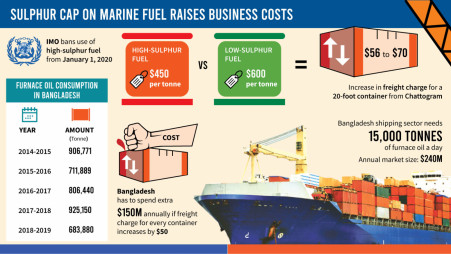Low-sulphur fuel rule makes shipping, business costlier
The Bangladesh RMG sector that is facing competition from countries like Vietnam, India, and Pakistan would be the worst sufferer

Bangladeshi businesses are now facing a new setback with increased freight charge following the enforcement of a new sulphur standard for marine fuels from January 1.
The freight charge for 20ft containers has gone up by $56 to $70 - around 20 percent of the present cost since then.
This extra cost of freight will put pressure on the businesses that are already in trouble with a disruption in global supply chain because of the outbreak of the novel coronavirus in China, now renamed covid-19 by the WHO.
The readymade garment sector, already facing stiff competition from Vietnam, India, and Pakistan would be the worst hit.
The hike will widely impact the RMG sector that is already going through a hard time for many reasons, BGMEA vice-president in Chattogram AM Chowdhury Selim said, adding, "this will increase our cost of doing business."
They say the cost of export will go up because of the increased freight charges.
Consumers will also have to dig into their pockets deeper as the higher freight cost will raise the prices of imported goods.
The International Maritime Organisation (IMO) in its 2019 guideline recommended banning ships from carrying fuels with more than 0.5 percent sulphur to reduce marine pollution. Before the new guideline, ships all over the world including 35 in Bangladesh, used furnace oil having 3.5 percent sulphur content.
Ninety-five percent of the shipping companies worldwide have switched over to low sulphur fuel to comply with the environment friendly recommendation.
The enforcement of the new IMO regulation has made shippers look for costlier low-sulphur fuels in the Singapore market, resulting in the hike in freight charges.
Mehrul Karim, CEO of SR Shipping Ltd, the largest oceangoing vessel company in Bangladesh said, "Due to the high price of the low-sulphur fuel, we have to adjust the surcharge with freight."
The price of low-sulphur fuel is now around $600 per tonne, whereas, the price of fuel with higher sulphur content is around $450.
"If the freight charge for every container increases on average by $50, Bangladesh would have to spend over $150 million as additional freight charges every year. This will negatively impact our business," said
Mahabubul Alam, president of Chittagong Chamber of Commerce and Industry (CCCI).
Major operators including Maersk Line have already announced a bunker adjustment surcharge of between $50 and $200 per 40ft container from March 1 this year. They, however, said the surcharge would depend on the origin and destination.
An officer of the Continental Traders, the local agent of China-based Cosco Shipping, told The Business Standard most of the operators had already started implementing surcharges.
Ahsanul Haque Chowdhury, president of Bangladesh Shipping Agents Association said, "We have to go by the rule but it will hurt our businesses. Now we are struggling with coronavirus impact. The freight hike for the IMO regulation is another hit."
Additionally, Bangladeshi ships cannot buy the low-sulphur fuel from the local market as the only source of it in the country, the Bangladesh Petroleum Corporation (BPC), is not yet ready to supply low-sulphur fuel.
As a result vessels deployed on the Chittagong-Colombo route are facing major problems. From Colombo, these vessels need to go to Singapore to take on low-sulphur oil before returning to Chattogram.
Meanwhile, BPC Director (operations & Planning) Md Sarwar Alam said they are getting ready to import and supply the fuel to the maritime vessels.
"We already sat with the shipping ministry and Bunker Supplier Association. We asked them to provide us with their estimated demand for furnace oil."
"The BPC will start importing this fuel once it gets the figures from suppliers," he added.
The BPC imports furnace oil, of which 95.44 percent goes to the power stations to produce electricity. Bunkering companies purchase the rest.
In 2018-2019, the country had a total demand of 683,880 tonnes of furnace oil.
Last year, a total of 4,978 vessels anchored in the Chattogram seaport, and 1500 in Mongla port, according to the shipping ministry.
The country's premier sea port Chattogram handled over three million TEUs (20ft equivalent units) containers in 2019.
Bangladeshi businesses currently spend over $9 billion as freight charges Sources at ports said even if 30 percent of these vessels buy fuel on their way back, the total figure will reach 5 lakh tonnes annually.
The shipping sector of the country has a daily demand for 15 thousand tonnes of furnace oil and the business turnover is worth $240 million per year.



 Keep updated, follow The Business Standard's Google news channel
Keep updated, follow The Business Standard's Google news channel
















